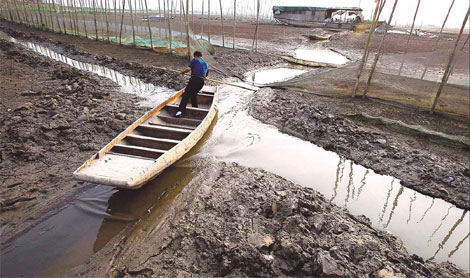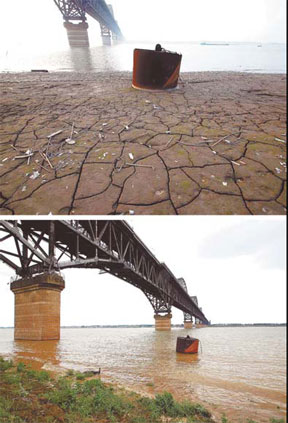Economy
Worst drought in 50 years along Yangtze
Updated: 2011-05-25 13:38
By Wang Qian (China Daily)
|
 A fisherman tries to paddle his boat through a stream amid the partially dried-up Honghu Lake in Honghu city, Central China's Hubei province, on May 20. [Photo / Xinhua] |
Dry spell ravages Central China
WUHAN - The worst drought in 50 years to hit provinces along the Yangtze River may continue to plague Central China.
The China Meteorological Administration warned on Tuesday that little rain is expected in the coming 10 days and highs of 36 C are likely to hit the central and southern parts of China.
These regions will mostly see hot, dry weather during the coming week, the administration said, adding that local departments will activate cloud seeding when weather conditions are fit.
Between January and April, the Yangtze River basin received 40 percent less rainfall than the average level of the past 50 years.
|
 This combination of photos shows the water level in the Jiujiang section of the Yangtze River in East China's Jiangxi province has risen from 9.2 meters on May 6 (above) to 10.8 meters on May 23 (below). |
As of Monday, the lingering drought in Hubei has affected nearly 10 million people, about one sixth of its population, and influenced 1.2 million hectares of farmland, causing direct economic losses of 7.1 billion yuan ($1.1 billion), according to the provincial civil affairs department.
Since the end of last autumn, most areas of Hubei have received 50 percent less rainfall than the same period in 2010.
The Office of State Flood Control and Drought Relief Headquarters asked the Three Gorges Dam to increase water discharges to up to 12,000 cubic meter per second (about 3,000 cu m per second more than the water flowing in) from May 25 to June 10, in order to raise the water level in the middle and lower reaches.
The water level in more than 1,300 reservoirs in Hubei province have dropped below the allowable discharge level for irrigation, said Yuan Junguang, director of the reservoir management office of Hubei provincial water resources department.
"Without adequate water, we lost the spring planting season for rice," said Zhou Xingtao, a farmer in Yandian village.
As the summer planting season approaches, farmers remain uncertain whether the occasionally pumped water will be sufficient.
Everything depends on rain, Zhou said.
With water conservancy facilities unable to provide enough water, farmers must pay high prices for irrigation, and this burden has forced some households to give up on this planting season, Zhou said.
In Hubei's Huanggang city, 3,800 kms of the city's 7,468 kms of irrigation channels are blocked, which means more than half of its farmland can't receive effective irrigation, Mayor Liu Xuerong said.
Specials

Suzhou: Heaven on Earth
Time-tested adages sing praises of Suzhou, and Michael Paul Franklin finds it's not hard to understand why on a recent visit.

The sky's the limit
Chinese airline companies are increasingly recruiting pilots and flight attendants as the industry experiences rapid expansion.

Diving into history
China's richest cultural heritage may lie in the deep, like exhibits in a giant underwater museum.



